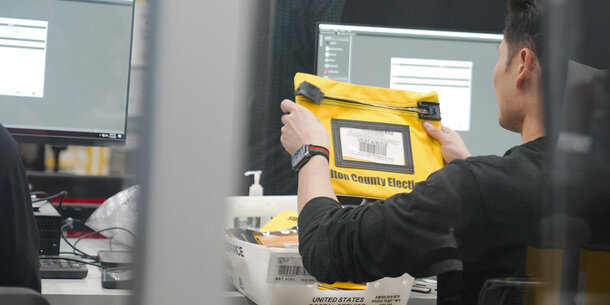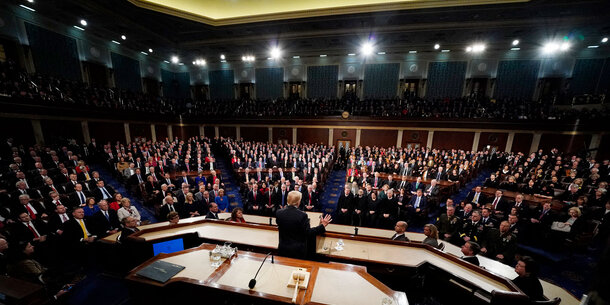The Brennan Center, the Cato Institute, and law professors Ilya Somin, John Dehn, and Geoffrey Corn filed a friend-of-the-court brief in a case challenging President Trump’s invocation of the Alien Enemies Act. The brief argues that the president’s attempt to use a wartime statute for peacetime immigration enforcement is manifestly unlawful and that courts have the authority to check this unlawful attempt to expand executive power.
On March 15, 2025, President Trump invoked the Alien Enemies Act of 1798 in order to detain and deport Venezuelan immigrants who are alleged members of the gang Tren de Aragua. In an emergency challenge to the invocation, the Supreme Court ruled that challenges to removal under the law must be brought in the judicial districts where detainees are being held. Challenges to the president’s invocation of the law have since been brought across the country.
On April 16, 2025, the American Civil Liberties Union filed a class action lawsuit on behalf of Venezuelan nationals being held under the Alien Enemies Act in the Northern District of Texas. After the district court declined the petitioners’ request for emergency relief, the Supreme Court issued an order temporarily prohibiting the government from deporting any members of the putative class of detainees under the Alien Enemies Act. On May 16, 2025, the Supreme Court sent the case back to the U.S. Court of Appeals for the Fifth Circuit to consider, among other things, the petitioners’ claim that the law does not authorize their removal.
On June 2, 2025, the Brennan Center, the Cato Institute, and law professors Ilya Somin and John Dehn filed a friend-of-the-court brief in support of petitioners. The brief argues that the text, context, and history of the Alien Enemies Act clearly demonstrate that it is a wartime authority that may be invoked only in the event of a declared war or an act of war undertaken by a foreign nation or government against U.S. territory; courts have the power to correct the misappropriation of the law in peacetime; and upholding or declining to scrutinize the president’s invocation of the law would invite further abuses of exceptional federal and state emergency powers. The brief was filed by the Brennan Center, Patterson Belknap Webb & Tyler LLP, and Ilya Somin.
On September 2, 2025, the Fifth Circuit panel handling the case ruled in favor of petitioners, holding that the Alien Enemies Act had been improperly invoked outside of war and in the absence of a military attack. The government requested that the full Fifth Circuit vacate the favorable opinion and rehear the case. The full Fifth Circuit granted the government’s request and scheduled its rehearing for January 22, 2026.
On November 13, 2025, the Brennan Center, the Cato Institute, and law professors Ilya Somin, John Dehn, and Geoffrey Corn filed an updated friend-of-the-court brief in support of petitioners in the upcoming rehearing of the case in the Fifth Circuit. The updated brief strengthens the arguments previously made and clarifies that the administration’s internationally and domestically unlawful airstrikes in the Caribbean do not affect the legality of the Alien Enemies Act invocation. The brief was filed by the Brennan Center, Patterson Belknap Webb & Tyler LLP, and Ilya Somin.


